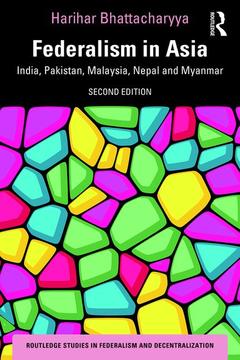Federalism in Asia (2nd Ed.) India, Pakistan, Malaysia, Nepal and Myanmar Routledge Studies in Federalism and Decentralization Series
Auteur : Bhattacharyya Harihar

This comprehensive book critically analyzes the successes and failures of federalism in India, Pakistan, Malaysia, Nepal and Myanmar for the political accommodation of ethno-regional diversity and assesses their comparative democratic significance for other countries in Asia.
This revised new edition incorporates updated demographic, religious and linguistic data for the case study countries and examines some of the major changes that have taken place in formally federal states since 2010, including the 18th Amendment of the Constitution in Pakistan in 2010, which gave a major turn to decentralization by empowering the provinces; the new federal democratic Constitution that was introduced in Nepal in 2015; and the abolition of the Planning Commission and the National Development Council in India. The author thematically examines the growing tensions between nation and state-building in ethnically plural societies; modes of federation-building in Asia; persistent ethnic tensions in federations and the relationship between federalism and democracy; and federalism and decentralization.
The book will be of use to advanced undergraduate and postgraduate students of Asian politics, comparative federalism and modern Asian political history and institutions, as well as policy makers on ethnic conflict regulation and peace studies and stakeholders in ethnic power-sharing and political order.
Introduction: Federalism in Asia 1. Concept of federalism and its relevance 2. Ethno-national diversity and federalism 3. Origin and development of federalism: colonialism, decolonization and revolution 4. Federalism and Institutional Innovations 5. Dynamics of federalism: political parties and ethnic movements 6. Centre-State relations: structure and processes 7. Federalism and Forms of Decentralization 8. Federalism and Democracy: New questions asked Conclusion: Beyond the Diversity problematic
Harihar Bhattacharyya is Professor of Political Science at Burdwan University, West Bengal, India. He has taught previously at Hull University, UK; Heidelberg University, Germany; and Delhi University, India. Known globally as an expert in Indian federalism and comparative federalism, he has published extensively on the subject. His book publications include Federalism in Asia (2010: Routledge); India as a Multicultural Federation: Asian Values, Democracy and Decentralisation(In comparison with Swiss Federalism) (2001); (co-authored) Radical Politics and Governance in India’s North East: The Case of Tripura (2018: Routledge); and Politics and Governance in Indian States: Bihar, West Bengal and Tripura (2018: World Scientific). His journal articles include: ‘Indian Federalism and Democracy: The Growing Salience of Diversity-claims over Equality-claims in Comparative and Indian Perspective’ (Regional and Federal Studies 2015) and ‘Pitfalls of India’s Ethno-federal Model of Ethnic Conflict Management: Tension Between Tribal Ethnicity and Territory in India's North East’ (Ethnopolitics 2019).
Date de parution : 08-2020
15.6x23.4 cm
Date de parution : 08-2020
15.6x23.4 cm
Thème de Federalism in Asia :
Mots-clés :
Centre State Relations; Central Government; ethno; UMNO; national; Indian Federalism; identities; Orang Asli; groups; Muslim League; pakistan; PPP; india; Ethno National Groups; indian; Tamil Nadu; muslim; India Act; league; Ethno National Diversity; diversity; Ethno National Identity; nepal; Autonomous District Council; myanmar; Democratic Decentralization; ethno-nationalism; Sixth Schedule; federalism; Harit Pradesh; federation building; Naga Customary Laws; asia; Yang di-Pertuan Agong; asian politics; Federal Solutions; Pakistan Movement; Asian Federations; Malaysian Federation; Centre Provincial Relations; Mu Proposal



